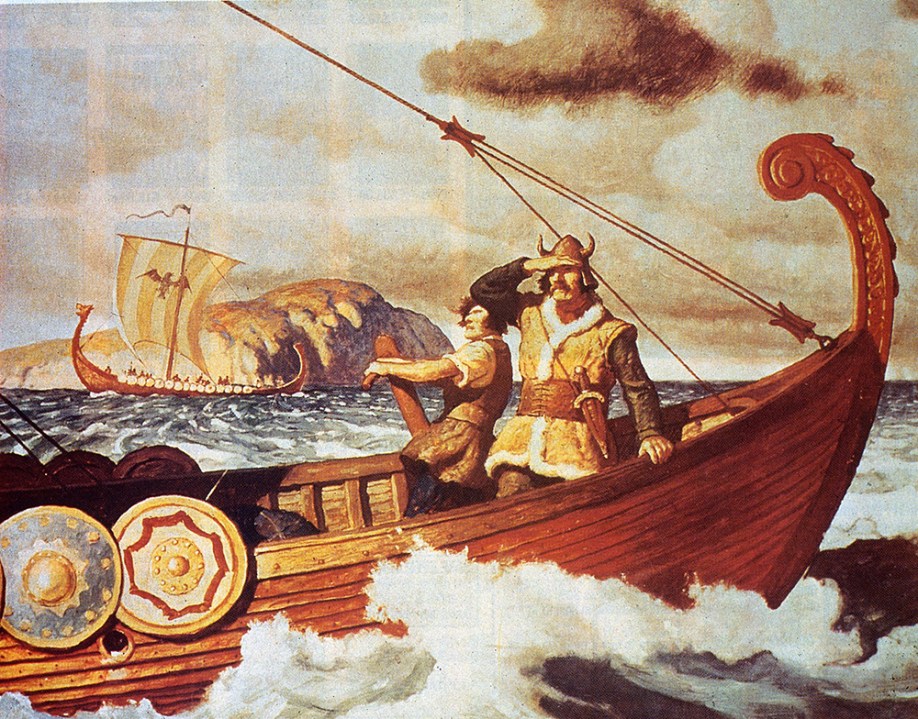It is easy to assume that there is not much to be said about the history of the Atlantic before 12 October 1492, when Christopher Columbus reached the Bahamas. In 2005, the Harvard historian Bernard Bailyn published a little book entitled Atlantic History: Concept and Contours which said absolutely nothing about what happened before Columbus, whom he barely mentioned. Atlantic history meant for Bailyn, and the growing mass of Atlantic historians, the story of modern contacts between the four continents that face the Atlantic, especially the nefarious slave trade linking Africa to the Americas.
Earlier centuries were seen as the fishing-ground of fantasists, who looked for ancient Egyptians or Irish monks credited with implausible journeys across the ocean, with the exception of the Norse men and women who reached North America in around 1000 without establishing permanent settlements. Here there is firm archaeological evidence from the northern tip of Newfoundland, making credible the claims of a couple of Icelandic sagas about the discovery of land beyond Greenland.
John Haywood does not ignore the fantasists who, even in antiquity and the Middle Ages, speculated about what might lie to the west of Europe and Africa. While no one expected a ship to drop off the edge of a flat Earth if it sailed too far west, rumours of islands had some basis in fact. The Strait of Gibraltar, with its strong inward current, was seen as a barrier. Medieval navigators waited until the late 13th century to create a sea route from Italy to England and Flanders.
Even so, the ancient Phoenicians did broach the strait en route to the island of Mogador, off Essaouira in Morocco, where they collected murex snails, out of which a rich purple dye was extracted. Prevailing winds apparently blew them to Madeira or the Azores, but they became secretive about the exact location when the Etruscans bid for possession of whatever fertile island they had found. According to Pliny, the north African King Juba sent ships to the Canaries, which then became largely forgotten, popping up occasionally in geographical tracts, such as that by Idrisi, a 12th-century Arab scholar at the court of the Norman king of Sicily Roger II. Mastering the Stone Age population of the islands proved remarkably difficult, and the Spanish conquest of Tenerife was only completed in 1496.
Along the flank of Europe, as far back in time as the Neolithic era and the Bronze Age, sea routes linked Orkney to the Irish Sea and southern Britain to France. A shipwreck off Dover contained bronze axe heads despatched from France that were apparently used as currency. Axe heads for different purposes were carried by warlike Angles, Saxons and Jutes from Denmark and Germany, who penetrated what became England from the third century onwards. They were followed by Viking raiders in later centuries, whose ships were more sophisticated and well suited not just to coastal raids but to trips upriver towards towns and monasteries rich in potential plunder.
Haywood has already written valuable books about these centuries, and the sections in this one that deal with the Vikings, getting on for half the overall text, are particularly gripping. The account of the 400-year residence of Norse settlers in Greenland is rich in detail about the challenging life it was possible to lead on the edge of the known world. They had land for sheep, but could grow very little, and they had to make trips to North America to obtain good-quality timber. But they were expert walrus hunters, and walrus ivory, exported to Europe, served as a good substitute for the elephant ivory used in the Islamic world.
The question whether anyone reached America from Europe before 1492 comes into its own when Haywood looks at tantalising evidence for English and Basque voyages towards the Newfoundland Grand Banks, which offered massive quantities of a staple protein, cod, while the Basques became expert whalers. But even when Europeans hit land across the Atlantic, they did not assume that they had reached a new continent. One view in medieval Scandinavia was that the Norsemen who landed in North America had reached a spur of land that jutted out of Africa. Pedro Alvares Cabral, who made an accidental landfall in Brazil in 1500, thought he had reached a sizeable island. And right up to his death, Columbus insisted that he had arrived at the edges of Asia, despite the reports of his friend Amerigo Vespucci that this was a ‘New World’ – justifying naming the Americas after Amerigo rather than Columbus.
A great strength of this book is that Haywood looks at those peoples in the Americas and West Africa who engaged with the sea, even if they did not strike out on long journeys across it. Around 1500, the Calusa, on the gulf coast of Florida, lived almost entirely from the sea, eating quantities of shellfish and building great ceremonial mounds from their discarded shells. The naked Yaghan of Tierra del Fuego also lived off shellfish and inured themselves to snow and hail by greasing their bodies with thick layers of seal fat. However, Haywood misses the opportunity to describe the impressive skills of ancient America’s greatest navigators, the Taínos, who inhabited the Caribbean islands at the time of Columbus’s arrival.
It is also a pity that he has restricted himself to just a handful of endnotes, nearly all references to original sources. There is so much fascinating information in the book that one would often like to know where to dig deeper. But Haywood’s aim has been to draw together material from different epochs and places that has all too often been treated in isolation, and he has succeeded triumphantly in providing a highly readable account of an important and neglected area of history.









Comments